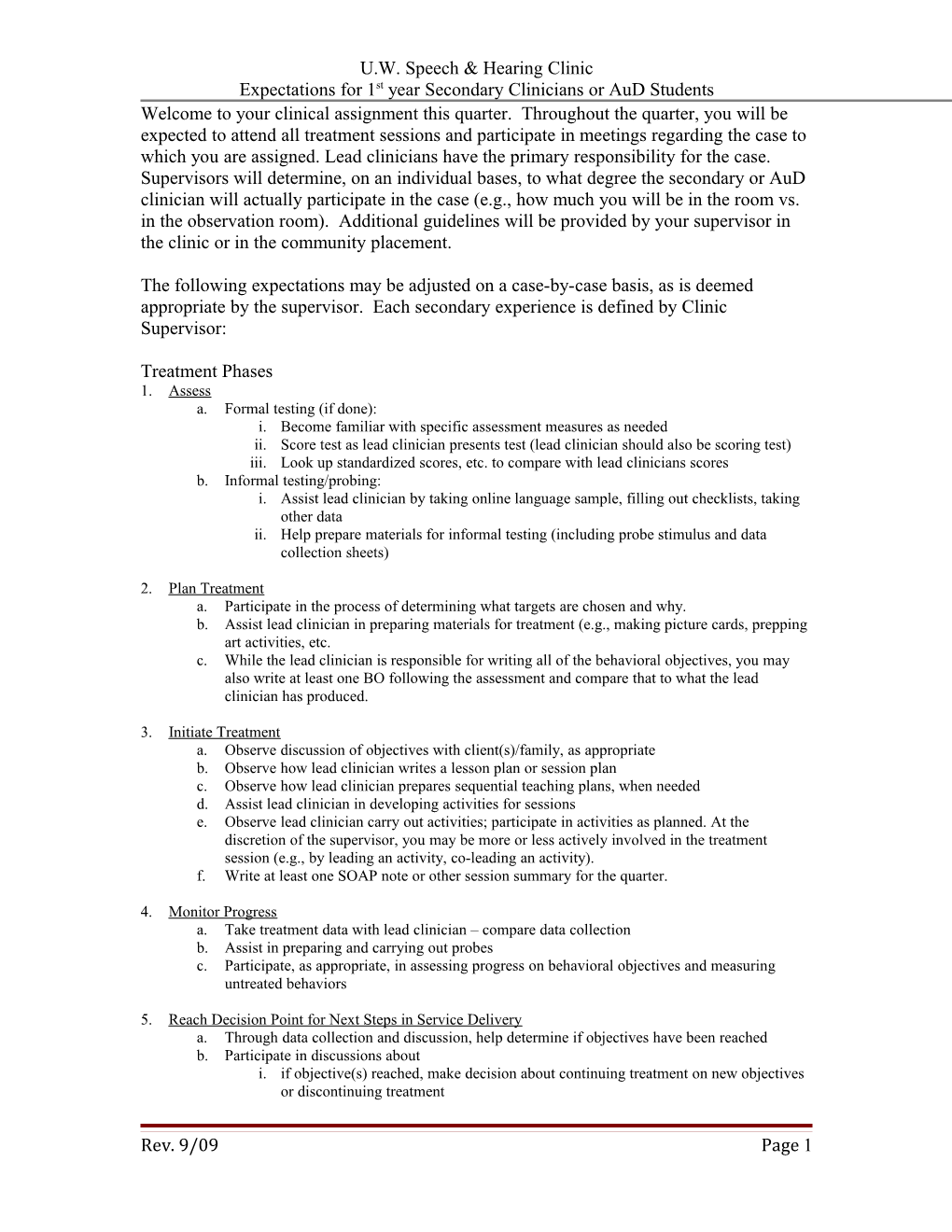U.W. Speech & Hearing Clinic
Expectations for 1st year Secondary Clinicians or AuD Students
Welcome to your clinical assignment this quarter. Throughout the quarter, you will be expected to attend all treatment sessions and participate in meetings regarding the case to which you are assigned. Lead clinicians have the primary responsibility for the case. Supervisors will determine, on an individual bases, to what degree the secondary or AuD clinician will actually participate in the case (e.g., how much you will be in the room vs. in the observation room). Additional guidelines will be provided by your supervisor in the clinic or in the community placement.
The following expectations may be adjusted on a case-by-case basis, as is deemed appropriate by the supervisor. Each secondary experience is defined by Clinic Supervisor:
Treatment Phases
- Assess
- Formal testing (if done):
- Become familiar with specific assessment measures as needed
- Score test as lead clinician presents test (lead clinician should also be scoring test)
- Look up standardized scores, etc. to compare with lead clinicians scores
- Informal testing/probing:
- Assist lead clinician by taking online language sample, filling out checklists, taking other data
- Help prepare materials for informal testing (including probe stimulus and data collection sheets)
- Plan Treatment
- Participate in the process of determining what targets are chosen and why.
- Assist lead clinician in preparing materials for treatment (e.g., making picture cards, prepping art activities, etc.
- While the lead clinician is responsible for writing all of the behavioral objectives, you may also write at least one BO following the assessment and compare that to what the lead clinician has produced.
- Initiate Treatment
- Observe discussion of objectives with client(s)/family, as appropriate
- Observe how lead clinician writes a lesson plan or session plan
- Observe how lead clinician prepares sequential teaching plans, when needed
- Assist lead clinician in developing activities for sessions
- Observe lead clinician carry out activities; participate in activities as planned. At the discretion of the supervisor, you may be more or less actively involved in the treatment session (e.g., by leading an activity, co-leading an activity).
- Write at least one SOAP note or other session summary for the quarter.
- Monitor Progress
- Take treatment data with lead clinician – compare data collection
- Assist in preparing and carrying out probes
- Participate, as appropriate, in assessing progress on behavioral objectives and measuring untreated behaviors
- Reach Decision Point for Next Steps in Service Delivery
- Through data collection and discussion, help determine if objectives have been reached
- Participate in discussions about
- if objective(s) reached, make decision about continuing treatment on new objectives or discontinuing treatment
- if objective(s) not reached, make decisions about continuing treatment on same objectives, discontinuing those objectives and adding new objectives, discontinuing treatment, or making referral.
- discontinuing treatment but plan future follow-up assessment/treatment
- Report Results of Treatment
- Observe end-of-quarter conference with client/family/others, as appropriate
- Observe how lead clinician writes the report and addresses the objectives
- Review report to identify aspects that need clarification, to note missing information, to find typos, etc.
- Co-Sign reports and assist in completing all documentation
- Quarter Wrap-Up
- Meet with Supervisor for final progress review
- Complete ART form with supervisor
- Enter Clock hours in online database and have supervisor verify
- Complete other duties as assigned
MINIMUM REQUIREMENTS FOR RECEIVING CREDIT AS SECONDARY CLINICIAN
Secondary clinicians will have several responsibilities for in-clinic activities and assignments, to be designated by the supervisor. Students must earn a minimum of 10 ASHA Clock Hours for an experience, but should anticipate an average of 20 hours across the quarter. Responsibilities and clock hours will vary according to the clinical assignment. Some responsibilities, particularly those related to professionalism and ethics, are constant over all clinical experiences. Below are the minimum requirements:
Secondary students will:
- Earn a minimum of 10 ASHA clock hours
- Meet deadlines for all assignments given
- Be respectful of the lead clinician
- Arrive for meetings and sessions on time
- Be appropriately prepared for assigned in-clinic sessions and activities
- Maintain appropriate professional behavior with families, clients, supervisor, primary clinician, and clinic staff
- Demonstrate appropriate interpersonal skills with families, client, supervisor, primary clinician, and clinic staff
- Comply with HIPAA Privacy and Security policies
- Abide by the ASHA Code of Ethics
- Be responsive to supervisory feedback and requests
Grades & documentation
All practica is credit/no credit and the grade is determined by the on-site supervisor.
- Grading for 2ndary practicum: SLP grads will use the ART form for Secondary Clinicians. ART data must be entered online before the final grade is given.
- Grading for AuD students in SLP practica: AuD grads will use the brief version of the AuD clinical evaluation form entitled “Evaluation of Knowledge and Skills Acquired.”
Rev. 9/09Page 1
